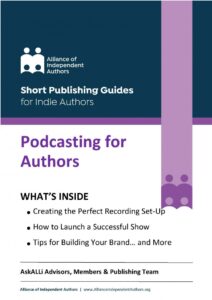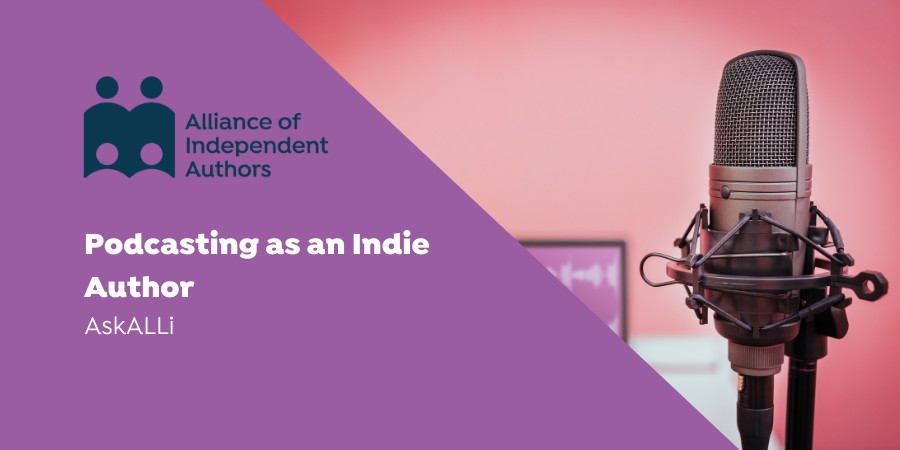Podcasting is popular business, many authors are taking up the mic and putting their voices out in the world to help them find readers, building up a platform and growing their confidence. Today, the Alliance of Independent Authors AskALLi team is launching a new book all about podcasting for indie authors. This is how to design a podcast show for indie authors.
 ALLi have a new short guide all about podcasting. ALLi members can download their complimentary ebook copy of Podcasting for Authors in the Member Zone. Navigate to allianceindependentauthors.org and log in. Then navigate to the following menu: BOOKS > SHORTGUIDES. Other formats are available to members and non-members in ALLi’s Bookshop
ALLi have a new short guide all about podcasting. ALLi members can download their complimentary ebook copy of Podcasting for Authors in the Member Zone. Navigate to allianceindependentauthors.org and log in. Then navigate to the following menu: BOOKS > SHORTGUIDES. Other formats are available to members and non-members in ALLi’s Bookshop
This Short Publishing Guide from the AskALLi team at the Alliance of Independent Authors will show you exactly how you can make inroads into podcasting to build your reader following and sell more books. In doing so, you will feel more engrained in the lives of your readers, and other authors.
What is Podcasting?
Podcasting is a term that has only entered the mainstream in the last decade. If you’re reading this book then you probably already know what one is and have listened to at least a single episode. A podcast is a digital audio file made available to download to a computer or mobile device via the internet, and typically taking the form of serial, on-demand episodes, following a format similar to radio shows. Listeners subscribe to the podcast, then episodes download automatically to their device through podcast players like iTunes, Stitcher, Spotify and Overcast.
Podcasts tend to be speech-based: interviews, talk shows, lectures, novels or anything you want to produce in audio format. The unique selling point distinguishing them from radio is that listeners can download the audio when they want and consume it on demand. Like self-publishing in comparison to traditional publishing, podcasting has given rise to a far more diverse and multi-faceted range of content than traditional voice media.
A few years ago, listening to a podcast was a niche interest activity, but as mobile technology evolved, the cultural zeitgeist shifted. Thanks to massive demand, access to technology and the omnipresence of the internet, more people than ever are now recording and listening to podcasts on every possible topic—an estimated two million unique shows, together encompassing 48 million episodes today, according to the Podcast Insights website. Ofcom tells us that one in eight people in the UK now listen to at least one podcast episode each week, and the US stats show a similar picture.
The industry is growing quickly and many authors have jumped into the space, as listeners, hosts and guests. Learning from peers, they are using this valuable platform to engage their community and draw attention to their brands and their books. Getting involved as a content creator can be daunting, but there’s no need to fret. This book will show you exactly how you can make inroads into podcasting to build your reader following and sell more books. In doing so, you will feel more engrained in the lives of your readers, and other authors.
To get the best results from this guide, it’s useful to understand some core principles. Firstly, podcasting is an industry in its infancy and its tools are constantly improving. While this book is up-to-date at the time of writing, some of the tools and processes may have changed by the time you read it.
Secondly, when referring to costs, we use United States Dollars (USD) unless quoting a source. USD is the most universal currency for indie authors as many of the dominant service providers are based in the US and operate in USD.
Thirdly, this guide is designed to be read chronologically but some contextual information has been repeated in multiple chapters, for those who prefer to dip solely into particular sections. We understand that authors’ lives are busy.
Doubt and Anxiety in Podcasting
If you aren’t particularly technically savvy, or you experience doubt and anxiety over appearing on a podcast, don’t worry. You aren’t alone. Most authors experience doubts, imposter syndrome and overwhelm at times. Podcasting is a relatively new space that requires skills you might not have developed yet. Read on, though, because these concerns diminish with exposure.
If you aren’t particularly technically savvy, or you experience doubt and anxiety over appearing on a podcast, that’s not a reason to forgo podcasting. You aren’t alone. Most authors and podcasters experience doubts, imposter syndrome, and overwhelm at times. Podcasting requires skills you are unlikely to have developed yet but these concerns diminish with exposure. You will continue to feel some degree of anxiety when approaching an unfamiliar topic – there’s no escaping that – but it’s okay to take your time. What’s important is that you get started and keep going. As the psychologist and self-help coach Susan Jeffers famously said, “Feel the fear and do it anyway.”
How to Design a Podcast
Author podcasts are as varied as the authors who create them. Each one has a different hosting style, format order, audience demographic and creator objective. The form is still evolving so innovation is rife at all stages of the creative process, from naming conventions, to artwork to merchandising. How you design and present your show is up to you. The only limit to what you can do with a podcast is your own imagination.
That said, there are things you can do to give your ideas a better chance of thriving. For instance, it helps to consider some of the following fundamental questions before you settle on a name and commission logo artwork:
- Why are you starting a podcast?
- What will be the tone and subject matter of your show?
If you aren’t sure how to answer these questions, sometimes free writing can help. The concept is simple: sit down with a pen and paper and write a stream of consciousness while trying to answer the questions you’ve been asked. Doing so often provides clarity, bringing your real thoughts and desires to the forefront in a way that can guide your actions.
Once you've answered the whys and whats, identify your podcasting goals. To phrase it another way, what's the purpose of your podcast and what outcome do you want it to deliver?
Here are some common goals in podcasting to give you ideas:
- To generate book sales
- To be recognised as an expert in your niche
- To share an important message
- To connect with a particular group of readers
It's helpful to write your answers down so you can refer back to them as you develop your show's concept. You may have more than one goal. If you do, note them all. You’re looking for a podcast concept that unifies them. Coming up with a strong vision at an early stage will stop you having to pivot after you’ve already build an established brand.
Choose a Theme
When you’ve settled on the audience you want to target and the goals you want to achieve, it's time to move from a general concept to a specific theme. This will be your niche – an idea around which you will orbit to build your defined audience over time. Examples include:
- Producing scripted LitRPG
- Teaching how to become a digital nomad
- The mindset of professional athletes
Your theme can be broad or narrow but you must be passionate about whatever you choose. It should be something you're excited to research and discuss on a regular basis because sticking to your theme is what will keep your core ideal audience engaged with your content.
Once you have an idea of what to podcast about, do market research. Search your show's topic on Spotify or Apple Podcasts. Listen to episodes of similar shows to see what they do well and think of ways they could improve. When you get an idea for a theme, look at the podcast charts to see if there are any shows already covering the cornerstone topics you have in mind. Are there many similar podcasts? If there are then that’s not necessarily a bad thing. The fact that they’re in the chart just proves that there is demand for the type of content you want to create. What’s different about your show could help it stand out from the rest.
If you still can’t tell whether your ideas will strike a chord after that activity, do some keyword analysis. This sounds complicated but it basically means finding out what people are searching. It’s easy when you know how. For example, if you’re looking to create a podcast that talks about popular TV shows, you could type the names of those shows into Google Trends and compare their search traffic, looking for TV shows that get searched a lot but aren’t being covered by other podcasts. Alternatively, you could visit answerthepublic.com and type in your topic. In response, the site presents a list of popularly searched questions on your given topic.
Ideally you want to find ideas that are:
- Popular enough to attract organic traffic
- Not so competitive that your podcast gets buried by competitors
This research will inform your theme. It’s okay to pick one that’s already popular as long as you believe that your unique take will be enough to help you grab attention. Just be sure that your theme has longevity. That it will stay interesting for you and generate enough long-term content to offer a steady stream of ideas. What notes are you already curating or collecting? What do people ask you about all the time? On what subjects do you have special insights or expertise? All of these questions can help you pick an effective theme.
Beware, though, if you are a multi-genre writer. Like readers, podcasting listeners can be choosy. Many have strong genre and topical preferences. Try to cover too many ideas and you’ll alienate potential listeners. Hence, the best strategy is to find a theme that will encapsulate your identity and appeal to as many listeners as possible without diluting your brand.
If some of your ideas don’t have an overlapping audience at all then it’ wise to choose. Pick one and podcast only about that if you want to capture a defined audience. That’s a proven way to form a cohesive brand and gather superfans. If you really want to appeal to two distinct audiences then you could mash them together in one podcast and risk losing the interest of many, or you could create a second podcast once you’ve gained more experience and can handle the extra workload.
Podcasting as an Indie Author: ALLi Team Experiences
We interviewed the ALLi team podcasters to understand their experiences with podcasting.

Howard Lovy, ALLi Multimedia Manager
Howard Lovy, ALLi Multimedia Manager
A journalist for more than thirty years, focusing primarily on science, technology, and innovation, Howard has always gravitated toward independent thinkers. Now, as an independent editor, podcast producer for ALLi and host of ALLi’s “Inspirational Indie Authors” podcast , Howard helps self-publishing authors find their voice.
Why do you podcast?
Give members a tip to help them podcast better.
What one mistake should members avoid when podcasting?
Doing the entire thing ad-lib is a mistake. Script out at least a portion of your podcast. You'll sound more professional.
***
Michael LaRonn, Member Q&A Podcast Co-Host and Outreach Manager

Michael LaRonn, Author and ALLi Outreach Manager
Michael La Ronn is the author of over 30 science fiction & fantasy novels and author self-help books. To date, he has published over 1.5 million words of fiction and nonfiction.
Since publishing his first book in 2014, he has produced a prolific writing portfolio while raising a family and working a full-time job in the insurance industry.
Why do you podcast?
I podcast because it’s talk therapy. Talking about publishing on a regular basis helps me solve my own problems. Plus, I get to help people.
Give members a tip to help them podcast better.
Audio, audio, audio. Investing in a good microphone is always a good idea. I’d start with a USB microphone—you can never go wrong with a Blue Yeti.
What one mistake should members avoid when podcasting?
Don’t mess around with sound effects if you don’t know what you’re doing. I once heard a new podcaster use a noise gate incorrectly in their recordings—every time they stopped speaking, it sounded like they were getting murdered because their voice dropped off suddenly. It was unlistenable. It’s better to have no audio manipulation than bad manipulation! If you don’t know what you’re doing, ask a more experienced podcaster to spare an hour of their time to show you how to do things properly, or invest in an audio editing course.
***

Sacha Black, ALLi Blog Editor
Sacha Black, ALLi Blog Manager
Sacha joined ALLi in 2017, and became a member of the team in May 2019. She edits the advice blog and manages the Self-Publishing Advice Conference. Sacha also writes nonfiction writing craft books and Young Adult fantasy novels. She's also the host of The Rebel Podcast.
Why do you podcast?
Give members a tip to help them podcast better.
What one mistake should members avoid when podcasting?
The biggest mistake I made was trying to make the podcast everything and trying to include everything in it. It made it too complicated and too time consuming. So I stripped it back, and made it simpler. That boosted my motivation and made me want to continue. It's important to keep the fun in the podcasting.
***

Orna Ross, Director of ALLi
Orna Ross, Director of ALLi, novelist and poet
Why do you podcast?
I find out what I’m thinking! And as speaking is so much easier than writing, I get lots of repurposable content for books and other publications
Give members a tip to help them podcast better.
This is a tip for getting more listeners Choose an SEO friendly title or subtitle, have a podcast homepage on a relevant website, with show notes and ideally a transcript, and make sure you add your podcast to as many directories as possible.
What one mistake should members avoid when podcasting?
Getting caught in tech. Unless you are an editing expert, outsource anything that’s time-consuming so you can focus on the content.
ALLi's Self-Publishing Advice Podcast
As part of its #AskALLi campaign, in which the Alliance of Independent Authors guarantees to answer any self-publishing question any author might have, we run a popular self-publishing advice podcast.
The podcast airs on Fridays and Sundays. On Friday, members of the ALLi team dive deep into topics of interest to indie authors. And every second Sunday, host Howard Lovy interviews ALLi members about their books and inspirations.
Here are the five steams of the #AskALLi Self-Publishing Advice Podcast:
Foundational Self-Publishing Advice Podcast: Orna Ross and Dan Parsons (video livestream + podcast)
Each month, this show explores a theme essential to self-publishers at all levels, particularly those just starting out, from the often differing perspectives of writing fiction or nonfiction. CLICK HERE to tune into ALLi’s Foundational Self-Publishing Advice Salon
Advanced Self-Publishing Advice Podcast: Orna Ross and Joanna Penn (video livestream + podcast )
Members’ Q&A Self-Publishing Advice Podcast: Orna Ross and Michael LaRonn (video livestream + podcast )
Each month, Orna Ross and Michael La Ronn answer members’ most pressing self-publishing questions. All are welcome to listen and learn but only paid-up ALLi Members can submit questions. CLICK HERE to tune into ALLi’s Members’ Q&A Self-Publishing Advice Podcast. (video livestream + podcast )
Self-Publishing News: Dan Holloway and Howard Lovy (podcast only)
Each month Dan Holloway and Howard Lovy discuss the latest news and trends of interest to indie authors. CLICK HERE to tune into ALLi’s Self-Publishing News Podcast
Inspirational Indie Author Interview (podcast only)
Every second Sunday, the #AskALLI podcast also offers a weekly Inspirational Indie Author Interview in which ALLi's multimedia manager Howard Lovy interviews ALLi members about the inspiration behind their books. CLICK HERE to tune into ALLi’s inspirational author Interviews. (If you're an ALLi member who'd like to be interviewed, write to Howard at [email protected])
Self-publishing is a fast-changing industry and in our #AskALLi podcasts we cover every aspect, from evergreen principles to the latest news, from beginner to advanced. Successful self-publishers trust ALLi to bring only the most up-to-date best practice and actionable ideas, tools and techniques.
Subscribe to ALLi’s Self-Publishing Advice Podcast
Want the new episodes as soon as they come out? Hit Subscribe in iTunes Apple Podcasts, or your favorite podcast player, to download new episodes automatically to your phone or device.






This is great news! I’ve been considering podcasting as an author, but felt a bit overwhelmed by where to start. A guide specifically for indie authors is exactly what I needed. I’m eager to check out the ALLi ebook and learn how to design a show that actually helps build my audience. Hopefully it’s not too complicated, I don’t want to feel like I’m driving an Eggy Car uphill when it comes to the technical side of things. Thanks for sharing!
Great article on podcasting for indie authors! Building a listener base authentically is key. Sharing my writing journey, including the frustration of facing countless rejection letters, felt like navigating the pipes in Flappy Bird – endless struggle! But connecting with readers through audio has been rewarding. What platforms have you found most effective for audience engagement beyond typical downloads? Thanks for sharing!
As speaking is so much easier than writing, I get lots of repurposable content for books and other publications.
Excellent work with the writing! Always keep an eye out for what the featured articles are going to be in this magazine!!
I love it! Maybe you can also see the change when we actively work
Great article. I’ve been checking this blog constantly and I’m impressed! Extremely useful information, especially the last part where wheel spinner made me process a lot of information. I have been looking for this information for a long time. thanks and good luck!
When did you last have a deep conversation with someone? I believe it was a long time ago.
Understanding some basic ideas will help you get the most out of this tutorial. To begin with, podcasting is a young business with continually developing technologies. While this book was written using the most up-to-date information available at the time of publication, some of the tools and procedures may have changed by the time you read it.